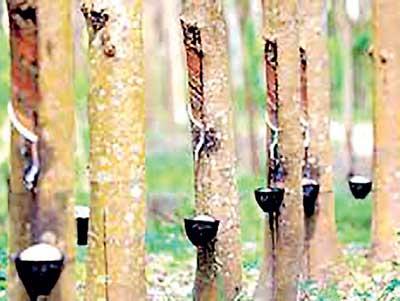11 Apr 2023 - {{hitsCtrl.values.hits}}
The local rubber sector was severely impacted in the month of March, due to the rupee appreciation. This, along with the gradual decline of natural rubber prices in the regional commodity markets, caused a drastic drop in the prices of all rubber grades, brokers said.
 According to the Forbes & Walker commodity brokers, the strengthening of the Sri Lankan rupee has created uncertainty among buyers.
According to the Forbes & Walker commodity brokers, the strengthening of the Sri Lankan rupee has created uncertainty among buyers.
As a result, all the grades went unquoted during the March 8, 2023 sale. The price of L.CR 1Xs and 1s eased sharply from Rs.625 to Rs.500 whilst No. 2s declined and settled at around Rs.400 by the end of March.
The price of No. 3s dropped from Rs.490 levels to Rs.370 levels. However, the demand for No. 3s picked up slightly during the latter part of the month, settling at around Rs.385 per kilo. No. 4s traded at around Rs.370 throughout the month.
Somewhat better demand was evident for scrap crepes, as the local manufacturers were actively engaged in rubber purchases during the period, Forbes & Walker said.
1X browns traded at around Rs.362 levels whilst 2X brown went unquoted. Popular grade 3X browns traded firmly and settled at around Rs.360 per kilo by the end of the month.
Demand for RSS remained flat during the month. RSS 1s traded at Rs.480 per kilo during the last sale whilst the rest of the grades went unquoted during the month of March.
In the global market, natural rubber prices eased gradually to settle around US $ 1.29 by mid-March. This was the lowest since late December 2022, due to uncertainties among traders towards the movement of top buyer China and the prospect of higher interest rates for a longer period.
Japanese rubber futures also declined during the given period, tracking weaker domestic equities and lower oil prices, as some manufacturers shifted to synthetic rubber as a substitute. On the supply side, the International Rubber Consortium indicated that the natural rubber output is expected to decrease in the major producing countries, due to the spread of leaf disease, adverse weather conditions, in particular drought and low fertiliser input.
Recent data showed Malaysia’s natural rubber production declined by 39.3 percent in January 2023 when compared to the same month last year. The International Rubber Consortium indicated that continued supply tightness in major producing countries may support the improvement of natural rubber prices going forward.
01 Nov 2024 5 hours ago
01 Nov 2024 5 hours ago
01 Nov 2024 7 hours ago
01 Nov 2024 7 hours ago
01 Nov 2024 7 hours ago